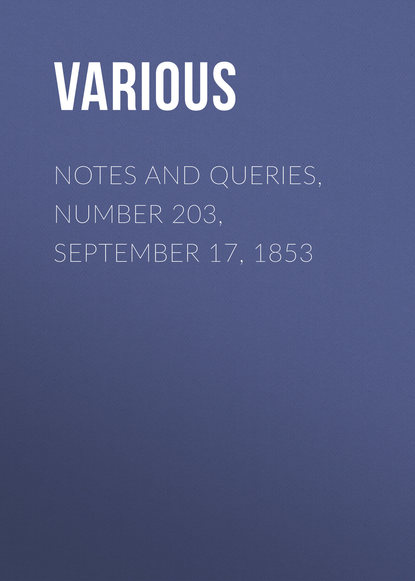По всем вопросам обращайтесь на: info@litportal.ru
(©) 2003-2024.
✖
Notes and Queries, Number 203, September 17, 1853
Автор
Год написания книги
2019
Настройки чтения
Размер шрифта
Высота строк
Поля
London: GEORGE BELL, 186. Fleet Street.
Now ready, Two New Volumes (price 26s. cloth) of THE JUDGES OF ENGLAND and the Courts at Westminster. By EDWARD FOSS, F.S.A.
Volume Three, 1272-1377,
Volume Four, 1377-1485.
Lately published, price 28s. cloth,
Volume One, 1066-1199,
Volume Two, 1190-1272.
"A book which is essentially sound and truthful, and must therefore take its stand in the permanent literature of our country."—Gent. Mag.
London: LONGMAN & CO.
MURRAY'S RAILWAY READING.
Just ready, with Woodcuts, fcap. 8vo., 1s.
THE GUILLOTINE. An Historical Essay. By the RIGHT HON. JOHN WILSON CROKER. Reprinted from "The Quarterly Review."
The former Volumes of this Series are—
LOCKHART'S ANCIENT SPANISH BALLADS.
HOLLWAY'S MONTH IN NORWAY.
LORD CAMPBELL'S LIFE OF LORD BACON.
WELLINGTON. By JULES MAUREL.
DEAN MILMAN'S FALL OF JERUSALEM.
LIFE OF THEODORE HOOK.
LORD MAHON'S STORY OF JOAN OF ARC.
HALLAM'S LITERARY ESSAYS AND CHARACTERS.
THE EMIGRANT. By SIR F. B. HEAD.
WELLINGTON. By LORD ELLESMERE.
MUSIC AND DRESS. By a LADY.
LAYARD'S POPULAR ACCOUNT OF NINEVEH.
BEES AND FLOWERS. By a CLERGYMAN.
LORD MAHON'S HISTORY OF THE "FORTY-FIVE."
ESSAYS FROM "THE TIMES."
GIFFARD'S DEEDS OF NAVAL DARING.
THE ART OF DINING.
OLIPHANT'S JOURNEY TO NEPAUL.
THE CHACE, THE TURF, AND THE ROAD. By NIMROD.
JAMES' FABLES OF ÆSOP.
To be followed by
BEAUTIES OF BYRON: PROSE AND VERSE.
A SECOND SERIES OF ESSAYS FROM "THE TIMES."
The ANCIENT EGYPTIANS. By SIR J. G. WILKINSON.
JOHN MURRAY, Albemarle Street.
notes
1
We had not seen this very able article until our attention was called to it by this letter. We regret that the author of it was not aware of what had been written in "N. & Q." on many of the points discussed by him. Such knowledge might have modified some of his views.
2
On this point we would call especial attention to Mr. Halliwell's communication on the Difficulty of avoiding Coincident Suggestions on the Text of Shakspeare, which will be found in our present Number.
3
One of the most specious arguments which have been advanced against the genuineness of the Notes and Emendations is, that they agree in many instances with readings which had been suggested many years before the discovery of the MS. Notes. Of course it is obvious that, wherever the readings are right, they must do so; and these coincidences serve to satisfy us of the correctness of both.











